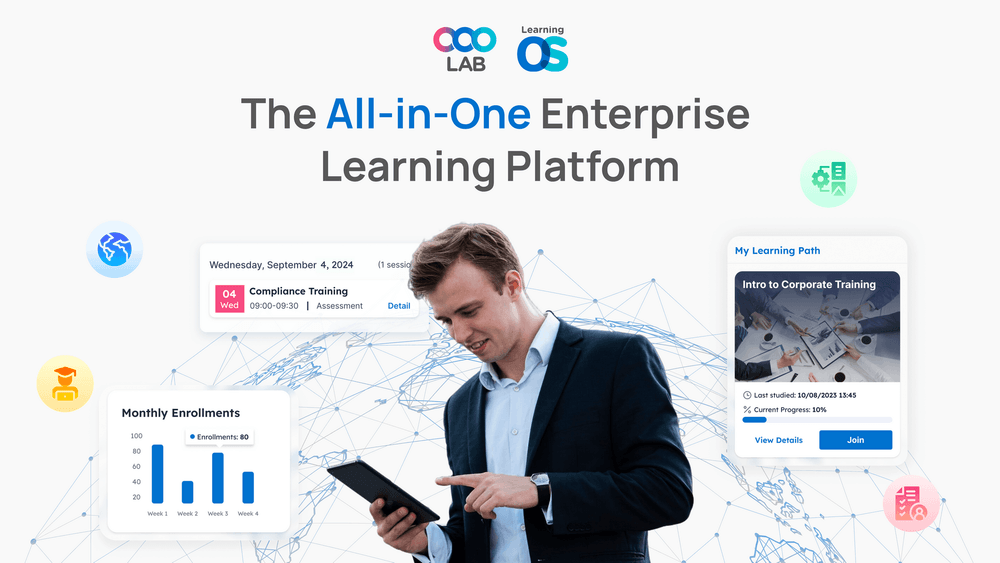

In today’s fast-paced, ever-evolving business landscape, organizations face the constant challenge of keeping their workforce adaptable, skilled, and competitive. As the workplace becomes more complex, traditional metrics such as IQ and EQ are no longer sufficient to capture the full spectrum of an employee’s capabilities. Enter Skill Quotient (SQ), a dynamic measure that evaluates an individual's or a team's ability to learn, apply, and adapt skills effectively in real-world scenarios.
This blog delves into the concept of skill quotient, its importance in Human Resources (HR), and how organizations can leverage advanced technologies like Enterprise LMS and AI-driven solutions to enhance it.

Skill Quotient (SQ) refers to an individual’s or a team's proficiency in acquiring, applying, and evolving their skills to meet current and future business demands. Unlike Intelligence Quotient (IQ) or Emotional Quotient (EQ), SQ is broader, encompassing both technical and soft skills.
As the workplace shifts towards digital transformation, the need for employees who can adapt to new challenges is growing exponentially. According to a report by the World Economic Forum, by 2025, 46% of all employees will need reskilling to align with evolving job roles. Organizations that proactively invest in skill development are better equipped to navigate this disruption and foster a resilient, future-ready workforce.
Moreover, studies show that companies with a high SQ workforce are more agile, innovative, and capable of achieving sustained growth. A well-rounded SQ enhances not only productivity but also employee engagement and retention, providing a competitive edge in the marketplace.
>>> Read more: Skill Quotient Training Tool
>>> Read more: Why Is Skill Quotient Important for Employees?
>>> Read more: How To Measure Skill Quotient In Employees?
>>> Read more: Mastering Skill Quotient Measurement: Key Metrics and Strategies for Accurate Assessment
>>> Read more: Social Quotient Vs Skill Quotient: A Comprehensive Analysis
>>> Read more: Skill Quotient Assessment Tools: Unlocking Employee Potential
In HR, SQ plays a pivotal role in shaping an organization's talent management strategy. It serves as a benchmark for identifying skill gaps, enabling personalized learning paths, and fostering a culture of continuous development. With businesses increasingly focused on agility, innovation, and customer-centricity, enhancing SQ is no longer just an option—it’s a necessity.
A recent study by Deloitte highlights that organizations with a high SQ outperform their competitors by up to 30%, showcasing the direct correlation between a skilled workforce and business success. By prioritizing SQ, HR professionals can build a more resilient workforce capable of driving sustainable results.
Book Free Demo with us. Bring your Training and Learning to a new height with LearningOS.

Improving SQ requires a multifaceted approach. Here are some actionable strategies that HR professionals can adopt to enhance Skill Quotient within their teams:
One of the most effective ways to boost SQ is by fostering a culture of continuous learning. Companies should provide opportunities for employees to engage in workshops, courses, certifications, and training programs that focus on both technical and soft skills.
For instance, research from Forrester shows that companies with robust learning programs experience 30% higher employee engagement compared to those without structured learning initiatives.
Artificial Intelligence has revolutionized training by offering personalized learning experiences tailored to individual needs. AI-powered platforms can assess employees' skill gaps and suggest the most suitable learning paths. This approach ensures that development efforts are efficient and targeted.
A McKinsey report found that AI-based training solutions improve learning effectiveness by up to 30%. Organizations that integrate AI into skill development see a 20% increase in employee performance compared to traditional training methods. AI-driven systems also provide real-time feedback, making it easier to track progress and adapt learning modules accordingly.
While technical expertise is essential, the ability to manage interpersonal relationships, think critically, and adapt to change are equally crucial. HR should focus on developing soft skills such as communication, problem-solving, and emotional intelligence to improve SQ.
According to Harvard Business Review, 85% of job success stems from soft skills, while only 15% is attributed to technical skills. Companies can incorporate workshops, role-playing exercises, and collaborative projects to enhance these competencies.
Gamification boosts engagement by turning learning into a fun and interactive experience. By integrating elements like leaderboards, challenges, and rewards, organizations can make skill development more enjoyable and impactful.
Platforms that combine AI with gamification are particularly effective, offering insights into performance and skill progress through analytics.
Regularly assessing employee skills ensures that SQ is continually evolving. Using AI-powered analytics, HR teams can track employee performance, highlight areas for improvement, and adjust training programs to meet specific needs.
Technology plays a pivotal role in improving SQ. Platforms that combine Enterprise LMS with AI capabilities offer a centralized, streamlined approach to skill development. These systems not only provide flexible learning opportunities but also automate administrative tasks, reducing the burden on HR departments. Benefits:
- Enhances the learning experience through personalized content delivery.
- Streamlines training processes, allowing employees to focus more on skill application.
- Improves scalability by providing easy access to learning materials for remote teams.
Organizations across industries are successfully implementing SQ strategies. For example, companies using AI-driven LMS platforms have reported a 25% increase in employee satisfaction, with improved retention rates and faster skill adoption.
Additionally, firms focusing on a balanced approach to both technical and soft skills have witnessed significant business growth, demonstrating how SQ impacts overall organizational success.
Skill Quotient is a critical component of modern HR strategies. By embracing continuous learning, AI-driven solutions, and holistic development programs, organizations can build resilient, adaptable, and high-performing teams.
Investing in Skill Quotient not only equips employees with the necessary skills to thrive but also positions organizations to excel in a rapidly changing business environment. With the right strategies, businesses can cultivate a workforce that drives innovation, agility, and sustainable success.
At OOOLAB (pronounced 'uːlæb'), our mission is to make complex learning operations simple. We aim to positively impact the lives of over 1,000,000 learners and educators by the end of 2026.
OOOLAB's LearningOS provides educational institutions and corporate enterprises with an all-in-one solution to create and deliver engaging learning experiences.
We meet organizations' needs or support your growth. We provide undivided attention. We provide:
1. Dedicated success manager: We offer direct communication with a real human who'll discuss your enterprises unique learning operations and goals.
2. Personalized setup: Our team will help you transition to LearningOS on your schedule, one step at a time.
3. Around the clock support: Get help from us any time, and in any time zone.
We have recently launched a new AI training tool, Skill Quotient OS, designed to elevate hybrid training to new heights. It offers role-play exercises with scenarios and assessments.This tool can apply in sales training, corporate development and customer support training in any industry.
Reach out to us at: LinkedIn, Facebook, Instagram, Tiktok, X
1. What are the main benefits of LearningOS
Our platform is easy to use and automates all aspects of your learning operations. It efficiently manages complex tasks, allowing you to concentrate on delivering exceptional learning experiences.
2. What main features does LearningOS offer?
Our all-in-one software solution combines a Content Management System, a Learning Management System, content authoring tools, and a mobile friendly Learner Portal.
3. Can your platform be used for corporate enterprises?
Absolutely! LearningOS is an Enterprise LMS is a great fit for corporate learning. In fact, we have clients with up to 700,000 employees using LearningOS! Upskill your workforce by creating and assigning interactive eLearning content while effortlessly tracking employee progress.
4. Who currently uses your platform?
Our platform is currently used by over 120,000+ learners, parents, and employees across 21 countries worldwide!
5. What types of content options are available on your platform?
We offer ready-to-go curriculums for various educational purposes or our expert design team can build a custom course for you. We can also upload your existing learning materials and enhance them digitally.
6. What is unique about LearningOS?
Our platform, designed by educators for educators, provides you with all the tools you need to scale. Build and promote your own hybrid and blended learning courses and save money on licensing fees by owning your own proprietary content.
7. How can I get started?
Schedule a meeting with our experts and we’ll talk about how our platform can address your unique challenges and help to grow your business.